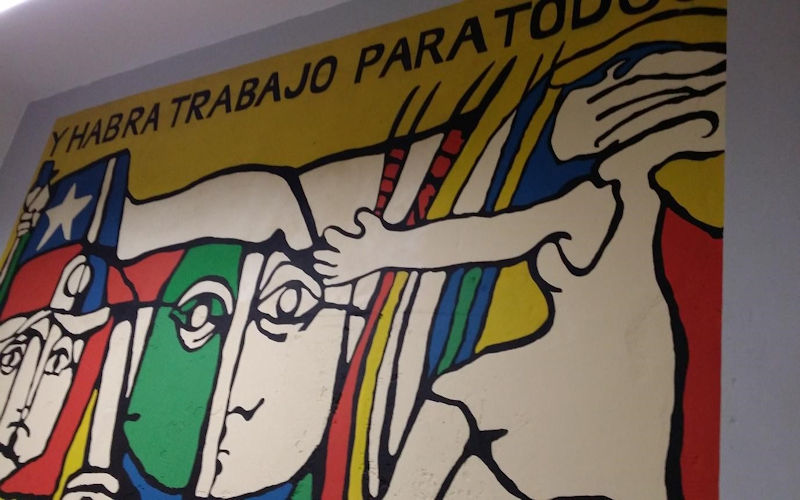Contested Territories Workshop Overview
A new network between the University of York, Sheffield and Leeds explores contested territories in Latin America. Research associate Hanne Cottyn reflects on the networks first workshop - read all about it here.

Contested Territories Workshop Overview
Leeds, 20-21 May 2019
Hanne Cottyn - Research Associate, Department of History
Conflict and contestation mark Latin America’s recent shift away from the so-called ‘pink tide’. An increasing reliance on old neoliberal recipes and an economic focus on (neo)extractivist growth fuels a rise in environmental destruction, exploitation and displacement in both rural and urban territories. Local communities across the region are taking up the struggle for social and environmental justice, contesting mainstream development models through powerful counter-narratives. These discourses have found their way into academic debates and new research lines that seek to include different sets of understandings, worldviews and grassroots knowledges.
On May 20th and 21st, the White Rose University Consortium on “Contested Territories in Latin America” organized the first international workshop in a series of three to explore novel epistemological, conceptual and methodological approaches to territorial struggles and alternatives in the region. A colourful group of researchers, coming from different universities and disciplines and with different levels of involvement in activist movements, joined at the School of Geography, University of Leeds. The central focus of the workshop was the notion of “Contested Territories,” a concept that aims to focus on the production and appropriation of space and knowledge(s) in and through often overlapping cultural, economic, environmental, political and spatial conflicts occurring at multiple sites, places and scales.
On the first day, keynote speaker Sam Halvorsen (Queen Mary University of London) kicked the event off with a thought-provoking talk on “socio-territorial movements” in Latin America, and how to de-centre traditional Anglophone discourses about territory. Several thematic sessions followed in which conceptual reflections and case studies on extractivism and the commodification of nature, migration and identity, and urban struggles in and beyond Latin America were shared and discussed. What surfaced from all presentations was the profoundly gendered, racialized and violent nature of the territorial processes under research.
Importantly, the workshop discussions did not develop in a sterile academic setting. During an evening gathering, activists from Leeds and Latin America shared their experiences regarding combatting racism in the UK, restoring and preserving artistic expressions of historical UK solidarity with Chilean refugees, and the social struggles of indigenous peoples and labour unions under the Maduro regime in Venezuela.
The second day focused on the methodological implications of understanding “contested territories”, through paper presentations, an energizing keynote and a hands-on participatory methods workshop. The methodologies panel brought concrete practices and experiences to the fore, giving insight into forum theatre, tracing the “everyday” in Amazon communities, decolonizing heritage, and conducting fieldwork in a context of violence and fear. Based on direct involvement in the Critical Geography Collective keynote Sofia Zaragocin (Universidad San Francisco de Quito) gave a challenging talk about “doing” decolonial feminist geography. Ironically, the very fact that Sofia was joining us remotely because of the “hostile environment” migration policies that had impeded her to travel to the UK spoke directly to the notion of “contested territories”. Under guidance of Juan Mario Díaz (University of Sheffield), the final workshop introduced us to the co-creation of audio-visual projects. With hands-on exercises and concrete examples from post-conflict Colombia, it gave us a taste of how to facilitate participatory video-making.
With the next event in this series of workshops in mind, members of the organising committee wrapped up the first day with a brief roundtable. A number of key questions that could help to foster further critical dialogue were formulated. Who resists, when, why, and how, and what happens when there is no contestation? Who conceptualizes these struggles, with which narratives and frames? How can we create meaningful alliances with activists engaging in territorial struggles and in developing alternative ways of knowledge production? Interestingly, these questions resonated with the ideas shared by several participants during a brainstorm in last session of the event, hinting at the importance of thinking through the role of research in processes of conflict and activism.
This workshop not only set out the lines for two promising future workshops, but also created a dynamic space for critical dialogue across and beyond academia. Rather than providing concluding answers on what “contested territories” exactly are, this workshop provoked new and engaging questions to be taken up in next events at the University of York and the University of Sheffield.
Visit the Contested Territories project page for more information.
Contact us
Interdisciplinary Global Development Centre
igdc@york.ac.uk
01904 323716
Department of Politics and International Relations, University of York, Heslington, York, YO10 5DD, UK
Twitter
Contact us
Interdisciplinary Global Development Centre
igdc@york.ac.uk
01904 323716
Department of Politics and International Relations, University of York, Heslington, York, YO10 5DD, UK
Twitter